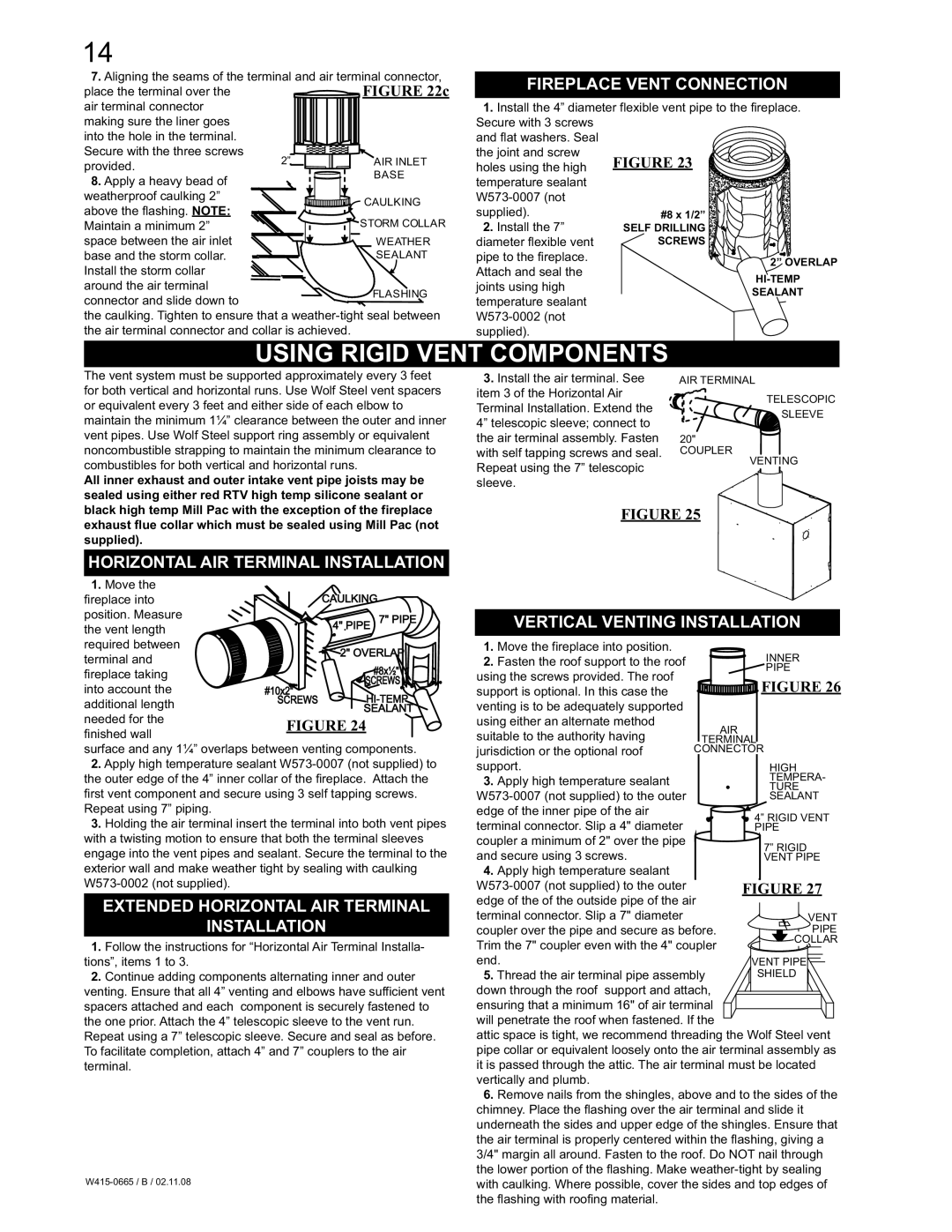
14
7.Aligning the seams of the terminal and air terminal connector,
place the terminal over the |
| FIGURE 22c | |
air terminal connector |
|
| |
making sure the liner goes |
|
| |
into the hole in the terminal. |
|
| |
Secure with the three screws | 2” | AIR INLET | |
provided. | |||
| BASE | ||
8. Apply a heavy bead of |
| ||
|
| ||
weatherproof caulking 2” |
| CAULKING | |
above the flashing. NOTE: |
| ||
| STORM COLLAR | ||
Maintain a minimum 2” |
| ||
space between the air inlet |
| WEATHER | |
base and the storm collar. |
| SEALANT | |
Install the storm collar |
|
| |
around the air terminal |
| FLASHING | |
connector and slide down to |
| ||
|
|
the caulking. Tighten to ensure that a
FIREPLACE VENT CONNECTION
1.Install the 4” diameter flexible vent pipe to the fireplace. Secure with 3 screws
and flat washers. Seal
the joint and screw holes using the high temperature sealant
2. Install the 7” diameter flexible vent pipe to the fireplace. Attach and seal the joints using high temperature sealant
USING RIGID VENT COMPONENTS
The vent system must be supported approximately every 3 feet for both vertical and horizontal runs. Use Wolf Steel vent spacers or equivalent every 3 feet and either side of each elbow to maintain the minimum 1¼” clearance between the outer and inner vent pipes. Use Wolf Steel support ring assembly or equivalent noncombustible strapping to maintain the minimum clearance to combustibles for both vertical and horizontal runs.
All inner exhaust and outer intake vent pipe joists may be sealed using either red RTV high temp silicone sealant or black high temp Mill Pac with the exception of the fireplace exhaust flue collar which must be sealed using Mill Pac (not supplied).
HORIZONTAL AIR TERMINAL INSTALLATION
1.Move the
fireplace into position. Measure
the vent length required between terminal and fireplace taking into account the additional length needed for the finished wall
surface and any 1¼” overlaps between venting components.
2.Apply high temperature sealant
3.Holding the air terminal insert the terminal into both vent pipes with a twisting motion to ensure that both the terminal sleeves engage into the vent pipes and sealant. Secure the terminal to the exterior wall and make weather tight by sealing with caulking
EXTENDED HORIZONTAL AIR TERMINAL
INSTALLATION
1.Follow the instructions for “Horizontal Air Terminal Installa- tions”, items 1 to 3.
2.Continue adding components alternating inner and outer venting. Ensure that all 4” venting and elbows have sufficient vent spacers attached and each component is securely fastened to the one prior. Attach the 4” telescopic sleeve to the vent run. Repeat using a 7” telescopic sleeve. Secure and seal as before. To facilitate completion, attach 4” and 7” couplers to the air terminal.
W415-0665 / B / 02.11.08
3. Install the air terminal. See | AIR TERMINAL | |
item 3 of the Horizontal Air | TELESCOPIC | |
Terminal Installation. Extend the | ||
SLEEVE | ||
4” telescopic sleeve; connect to | ||
| ||
the air terminal assembly. Fasten | 20" | |
with self tapping screws and seal. | COUPLER | |
Repeat using the 7” telescopic | VENTING | |
| ||
sleeve. |
|
FIGURE 25
VERTICAL VENTING INSTALLATION
1.Move the fireplace into position.
2. Fasten the roof support to the roof using the screws provided. The roof support is optional. In this case the venting is to be adequately supported using either an alternate method suitable to the authority having jurisdiction or the optional roof support.
3. Apply high temperature sealant
4.Apply high temperature sealant
5. Thread the air terminal pipe assembly down through the roof support and attach, ensuring that a minimum 16" of air terminal will penetrate the roof when fastened. If the
attic space is tight, we recommend threading the Wolf Steel vent pipe collar or equivalent loosely onto the air terminal assembly as it is passed through the attic. The air terminal must be located vertically and plumb.
6.Remove nails from the shingles, above and to the sides of the chimney. Place the flashing over the air terminal and slide it underneath the sides and upper edge of the shingles. Ensure that the air terminal is properly centered within the flashing, giving a 3/4" margin all around. Fasten to the roof. Do NOT nail through the lower portion of the flashing. Make
